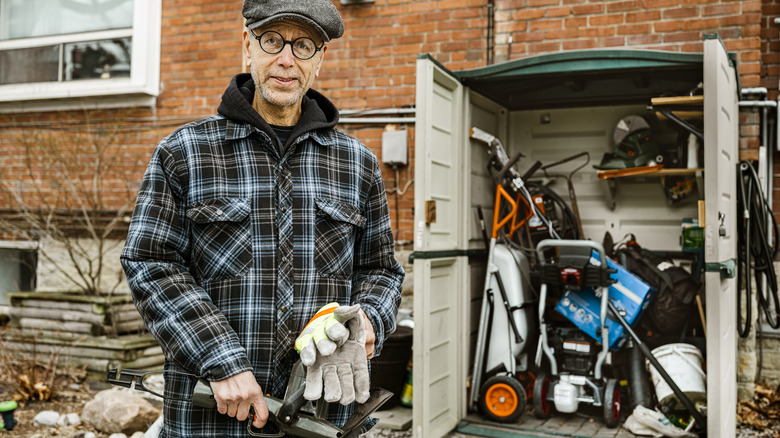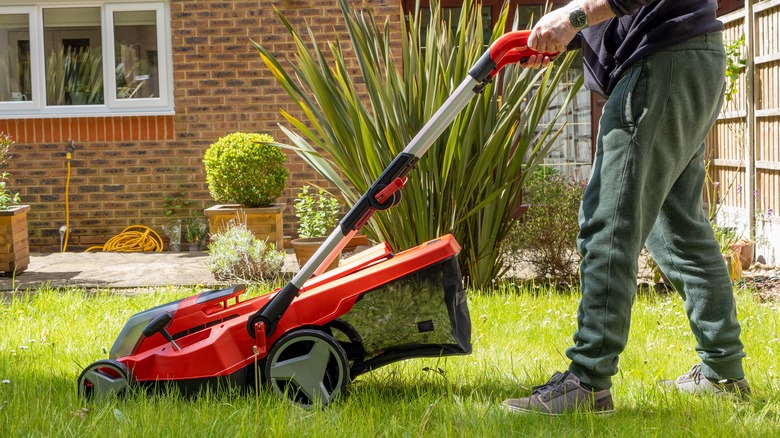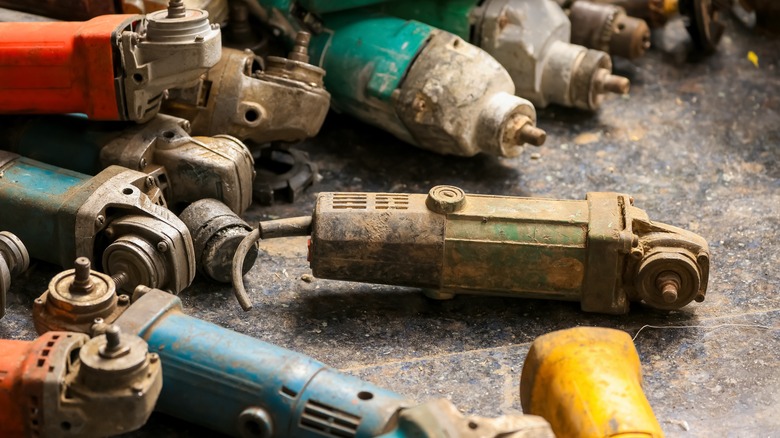Is Storing Power Tools In A Shed A Good Idea?
Ah, the glorious shed. You fought hard for it. You argued with the county over permits, argued with the HOA over what color it was, and argued with your children over whether they could legally move into the shed and gain squatter's rights. It got your lawnmower out of the garage, along with all of those ridiculously expensive trimmers and edgers and nippers (all with batteries the size of an Xbox). You thought about moving a recliner in there as a kind of dual-purpose shed but ran out of room. That's okay; it's still glorious. And you might get the recliner in there after all, because you've heard that your power tools really shouldn't be stored there. Will you really have to evict all the power tools, including the electric mower? Well... probably not, but before you decide there are some things you need to think about.
It all has to do with getting things "out of the weather"... which is pretty frustrating, since that's what you thought a shed was for in the first place. But the problem is that a shed is meant to keep the worst of precipitation off your belongings, and doesn't always offer protection against extreme temperatures or wild humidity swings. More frustrating still, most of the things that might need protection from the weather are things designed to be used outdoors... but now they apparently want to be lounging about in a giant cigar humidor, or perhaps a wine fridge.
Batteries are the real problem. But not really.
For the same reason that your garage might not be the best place to store spare batteries, a shed isn't ideal either. Lithium batteries are prone to a problem called "thermal runaway," in which the batteries get into a cycle in which they heat themselves faster than their paltry fans and heat sinks can whisk the heat away. Thermal runaway is more likely when batteries start the workday hot, and cells in thermal runaway might explode or catch fire. On top of that, the heat can reduce the service life of these batteries... not ideal since the 20V 10Ah batteries that power DeWalt mowers currently cost $229 at Lowe's, and the 40V 6Ah battery for that Kobalt electric lawn mower TikTok is obsessed with runs $249.
But take heart: While you should avoid storing your power tool batteries in temperatures above 90 degrees, and they'll perform more readily if you keep them above 35 degrees, you can probably manage that range in a well-ventilated shed out of direct sun. But even if you can't, there's a good chance nothing's going to blow up on you. Modern lithium batteries have built-in circuitry (or work with tools that have built-in circuitry) to prevent a number of dangerous situations like overcharging, over-discharge, and thermal runaway. So your odds of a catastrophic battery failure are about 1 in a million. By contrast, you have about 1 chance in 15,300 of being struck by lightning over an 80-year lifetime.
So are the tools themselves the real problem? Sort of.
Temperature fluctuations and high humidity (the sorts of things that happen regularly in a shed) can cause problems with your power tools in other ways... most commonly, in the form of rust. When humidity is high, usually above 80%, moisture in the air can directly cause rust on some surfaces. More common, though, is rust caused by condensation when a metal surface cools below the dew point. The higher the humidity, the less temperature difference you need between the cool metal and the air around it to get condensation. Here's an example scenario: Let's say the humidity is holding steady at 60%. Overnight, the temperature drops to 40 degrees. As it begins to warm up the next day, the temperature in the shed hits 60 degrees but the metal is only at 46 degrees. Since 46 degrees is the dew point (at 60% humidity and 60 degrees), water starts to condense on the metal. Next stop: rust.
Fortunately, you have a few options to deal with this. After removing any surface rust, you need to either control temperature or humidity or otherwise protect the metal. You can manage humidity with air conditioning, a dehumidifier, or with a desiccant (if the tools are in a sealed container). You can also protect metal surfaces with oil, paste wax, or any number of other genius tricks to prevent metal from rusting. Oiling is probably easier than moving the tools inside the house with you.


